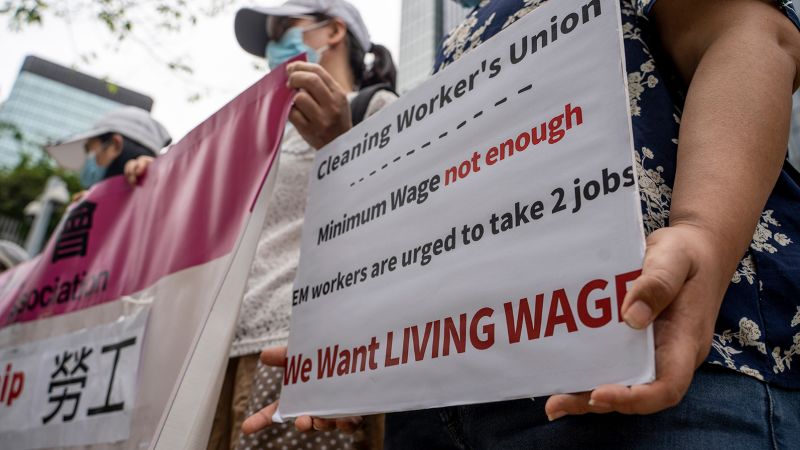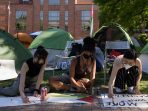Hong Kong
CNN
—
It’s one of the world’s priciest cities, with the least affordable housing market on the planet and parking spaces that can go for nearly a million dollars each.
So when the Hong Kong government raised the minimum wage by a measly 32 cents on Monday, activists and community workers were scathing in their response.
“We think this is unacceptable,” said Wong Shek-hung, director of the Hong Kong, Macau and Taiwan program at the charitable organization Oxfam. “It cannot cover basic needs in Hong Kong.”
The new minimum wage now stands at 40 Hong Kong dollars ($5.1) per hour, up from the previous 37.5 Hong Kong dollars ($4.78) per hour.
The minimum wage, first established in 2011, is supposed to be reviewed every two years — but it was frozen at the previous rate in 2021 due to the city’s Covid-stricken economy, with authorities at the time arguing that a wage increase would put “additional pressure on enterprises” and risk slashing low-wage jobs.
But Wong said this new increase will make little difference in Hong Kong, consistently ranked one of the world’s most expensive cities.
In 2022, it tied with Los Angeles for fourth place on the Worldwide Cost of Living Index, released by the Economist Intelligence Unit (EIU). New York, Singapore and Tel Aviv sit at the top three spots.
By comparison, New York has a minimum wage of $15 per hour, and Los Angeles has $16.78 per hour; Tel Aviv ranges from $8.27 to $8.45 per hour depending on the total hours worked. Singapore offers different minimum wages depending on sector, applicable only for citizens and permanent residents.
Oxfam said the new wage is still lower than what a family of two would receive through the city’s social security program and would demotivate workers. It has urged the government to raise the minimum wage to at least 45.4 Hong Kong dollars ($5.78) an hour, calling the new increase “almost negligible.”
But Hong Kong’s Secretary for Labour and Welfare Chris Sun rejected this argument in January, claiming that “many people … would rather work than receive social welfare because they think it has more value in their lives.”
“After all, do people like to go to work or not? In fact, going to work is not just for earning money. It is important to one’s spirit and health,” Sun said, according to public broadcaster RTHK. “So the two can’t be compared. One is welfare, the other is work.”
The Hong Kong Society of Community Organizations (SOCO), also proposed a higher minimum wage of at least 53.4 Hong Kong dollars ($6.8) per hour, and argued the city should follow other countries in setting a minimum wage between half to two thirds of the median wage.
The city’s median hourly wage last year was 77.4 Hong Kong dollars ($9.86), according to the Census and Statistics Department.
The minimum wage does not apply to foreign domestic workers — a crucial part of the city’s economic and social fabric, who are from countries like the Philippines and Indonesia and are required by law to live in their employers’ households.
Hong Kong’s economic landscape has been rocked in recent years by the Covid-19 pandemic and politics.
The pandemic devastated the food, beverage, hospitality and tourism industries. Meanwhile, various labor and trade unions, which for decades have been vocal advocates representing hundreds of thousands of workers, disbanded after the introduction of a sweeping national security law that has been used to jail political figures, journalists, teachers and protesters.
For many years, thousands of protesters would take to the streets each Labor Day on May 1 to air grievances or demand better conditions. But mass protests have all but disappeared since the national security law was imposed.
On Monday, there were only a handful of small demonstrations, with photos showing people holding signs outside government offices demanding higher wages.
The pandemic also widened an already severe wealth gap, with the richest households now making 47 times more than the poorest ones, according to a study by Oxfam released last October.
“The incomes of the poorest decile fell by more than 20% compared to their incomes before the Covid outbreak,” it said in a statement at the time, pointing to other issues such as significant unemployment among those living in poverty.
The proportion of people living on minimum wage — comprised mostly of workers in sanitation, cleaning, security and retail — is actually lower now than a decade ago, said Wong. Only 2.6% of employees earned less than $40 an hour in 2021, compared to 6.4% in 2011.
But, she added, the gap between the median and minimum wages has increased, meaning the wealth disparity has gotten worse. Even if the minimum wage increase means workers are earning slightly more money “in absolute terms … they can’t share the economic growth of the city at the same pace,” she said.
This has posed a particular challenge in the face of global inflation, which has eroded people’s standards of living.
Food costs in Hong Kong have risen by more than 7% from December 2019 to December 2022, said Wong, citing the consumer price index (CPI) — meaning people living at minimum wage “have to save up (a lot) of the money, and maybe they cannot have enough to afford a nutritious diet to sustain a healthy life.”
Energy costs have also increased by more than 11% during the same period, she said, reflecting similar increases around the world. In the US, electricity prices rose 12% in just 12 months, according to 2022 data.
“This is a very heavy burden for those low-income families,” said Wong.
Sumber: www.cnn.com






